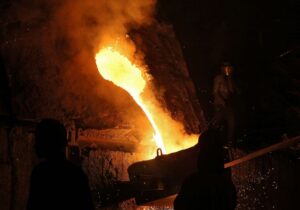ArcelorMittal’s Legal Battle with the Indian Government: A Deep Dive into the Steel Import Controversy
In a significant legal move, ArcelorMittal Nippon Steel India has taken the Indian government to court over restrictive import regulations pertaining to low-ash metallurgical coke (met coke), a critical raw material in steel production. This situation not only highlights the growing tension between major industrial players and government policies but also raises questions about the future of India’s steel sector and its regulatory environment.
The Crux of the Dispute
The Indian government introduced new curbs on imports of met coke starting in January, aimed at protecting local suppliers. This decision has caused ripples across the sector, particularly affecting giant players like ArcelorMittal Nippon, who have voiced concerns over the quality of domestically sourced met coke. The new import restrictions, which impose quotas based on country of origin, have been perceived as a significant blow to large manufacturers relying on high-quality imports for their operations.
ArcelorMittal Nippon has taken this issue to the Delhi High Court, challenging the government’s decision to retroactively enforce these import restrictions. They argue that their orders for 168,300 million tonnes of met coke from Indonesia and Poland were placed before the restrictions came into effect, and that denying these imports contradicts India’s commitment to free trade principles.
Implications for the Steel Industry
This clash is more than just a legal battle; it has serious implications for the operational stability of steel producers in India. In its filing, ArcelorMittal Nippon warns that these curbs might force a severe reduction in steel production and delay critical expansion plans. With India’s burgeoning steel market—boasting an annual capacity of 200 million metric tons—such disruptions can have ripple effects throughout the economy.
Industry analysts have noted that the restrictions could potentially push steel prices higher, affecting various sectors reliant on steel for manufacturing and infrastructure development. In fact, another significant player, JSW Steel, has also pursued legal action against the government over delays in clearing imports, further indicating a growing frustration within the industry regarding policy implementation.
Financial Ramifications
The stakes in this dispute are high. ArcelorMittal Nippon claims that the government’s five-year plan to curtail imports could lead to substantial financial losses, estimating a cost of $25 million for each delayed consignment. Moreover, the company faces vessel detention charges that could spiral up to $27,004 per day, placing further strain on already tight margins.
The company has gone as far as to express that, without timely resolution of these issues, they may be forced to shut down operations entirely by June. This scenario presents a concerning outlook for the estimated 5% share that ArcelorMittal Nippon holds in India’s steel market.
Government Position and Future Outlook
In response to the ongoing legal battles, Indian government officials assert that there is sufficient domestic met coke available, and that the restrictions are meant to stabilize the local market. They have indicated that some companies are opting for imports primarily due to cost differentials that range between $50 to $100 per tonne.
However, from a broader economic perspective, such protectionist policies could lead to uncertainties that deter future investment, both domestically and from foreign firms. This legal confrontation may serve as a litmus test for how India balances its commitment to protecting local industries while fostering a competitive business environment.
Conclusion
As the legal proceedings unfold, the industry keenly awaits the Delhi High Court’s ruling. The outcome could either reinforce the government’s approach to regulating imports or force a reassessment of how such policies are crafted and implemented. For investors and stakeholders in the steel sector, this scenario illustrates the delicate balance between regulatory frameworks and market dynamics in a rapidly evolving economic landscape.
Stay tuned to Extreme Investor Network for further updates and in-depth analysis on this critical issue impacting India’s steel industry and the broader economic environment.

